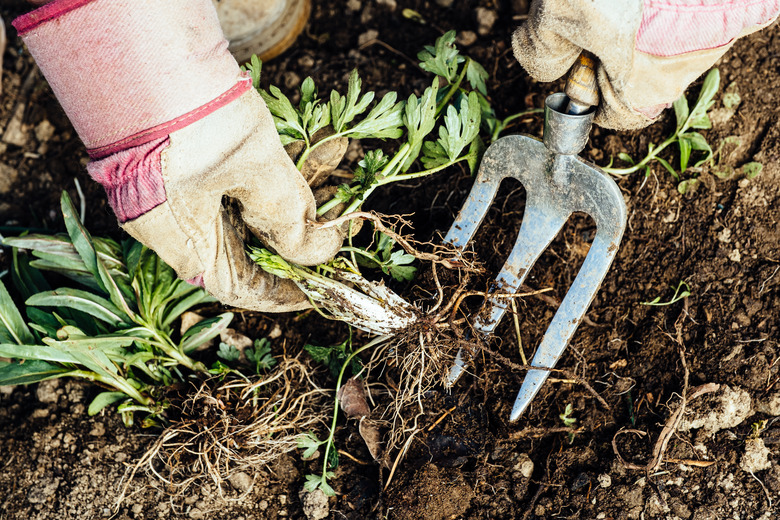Natural Ways To Kill Weeds With Baking Soda And Vinegar
We may receive a commission on purchases made from links.
Weeds are the bane of any gardener's existence, but toxic herbicides used to kill them can harm insects, worms, and aquatic animals. That's why weeding by hand is the most eco-friendly way of removing weeds. However, it can be backbreaking work to keep up with weeds that persistently pop up throughout flower beds. Weeds can also be especially hard to dig out of gravel or cracks in sidewalks and driveways. You can fight weeds with natural ingredients from your kitchen like baking soda and vinegar.
Baking Soda as a Weed Killer
Baking Soda as a Weed Killer
Baking soda, or sodium bicarbonate, damages weeds because of its salt content. The salt dries up leaves and kills plants when drawn in through roots in the soil. Salts can remain in the soil for a long time and leach into surrounding areas, so this method is best used away from the lawn and desired plants. Don't expect to plant anything else in the area until several soaking rains have washed the baking soda away.
First, wet the weeds with a hose so that the baking soda will stick to the foliage and the surrounding soil. Then sprinkle baking soda over the weed you are targeting, using about a teaspoon to coat the entire plant. Repeat in a few days if you do not see any wilting or browning. For problem areas in walkways, driveways, and patios, sprinkle the baking soda along cracks and sweep it in with a broom. Besides killing off existing weeds in cracks, the baking soda will help prevent more from growing.
Vinegar as a Weed Killer
Vinegar as a Weed Killer
The acetic acid in vinegar burns the foliage on weeds, usually within a day. This will weaken the plants, but vinegar is most effective on young, broadleaf weeds. Several applications could be required to kill large or deeply rooted plants. While this might seem like more work, vinegar can be an effective weed-killing solution in areas where you want to avoid using salt and ultimately rendering your soil inhospitable to plants.
For an easy herbicide, use white vinegar from your kitchen in a spray bottle. Add a tablespoon of dish soap per gallon of vinegar so that the spray will stick to leaves and break down their protective coating. You can also use a horticultural vinegar with an extra-strong solution for a more powerful herbicide. Horticultural vinegar is corrosive and can harm the skin and eyes, so wear gloves and eye protection before applying the spray. Use on a calm day and avoid spraying grass or the leaves of valuable garden plants. Vinegar will break down in the soil quickly, but manufacturers recommend waiting a week to replant sprayed areas.
Vinegar and Baking Soda Weed Killer
Vinegar and Baking Soda Weed Killer
A spray made of vinegar and baking soda is a doubly effective method for killing weeds by burning leaves and dehydrating plants through their roots. Use 1 part baking soda to 2 parts vinegar. Pour the baking soda into the spray bottle first, then add the vinegar. After the mixture has stopped bubbling, add a squirt of dish soap to the bottle, screw on the nozzle, and shake it. Thoroughly spray the leaves of your weeds. Again, keep in mind that this potent combination will prevent other, more-desirable plants from growing in that location until the baking soda has washed away.
Whichever herbicide you use to kill weeds, be careful to use the smallest amount necessary to do the job. After all, the goal and benefit of using these natural products is to avoid harming the environment.
